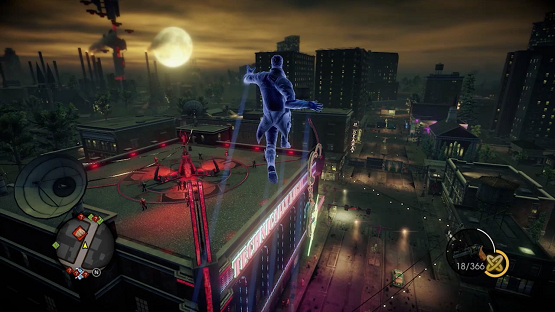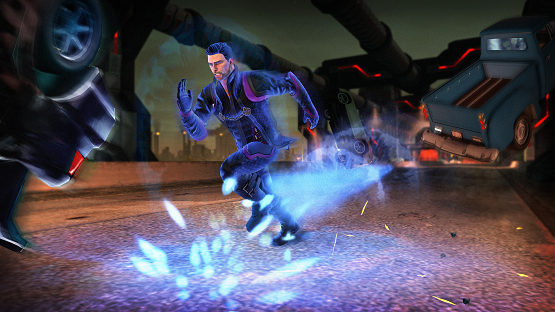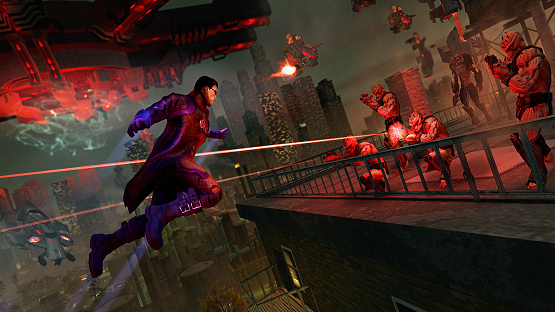I knew from the moment that I leapt aboard a launching nuke to disable it as Aerosmith’s I Don’t Want to Miss a Thing played less than ten minutes into Saints Row IV that I was in for quite a treat. Saints Row IV was bound to be no-holds-barred, ridiculous, over the top fun, and it delivered on these early promises very well through a variety of moments, dialog, and gameplay features. But it’s not all sunshine and roses, as a few issues kept my extraterrestrial adventures as the extremely unorthodox President of the United States from being a perfect experience.
Continuing where Saints Row: The Third left off, the early section of the game sees the Boss of the Saints becoming the leader of the free world, and many familiar faces joining his presidential cabinet. Right away an alien invasion decimates the white house and results in many of these characters being abducted and placed in a simulation of Steelport, the city from the previous game, in which the majority of Saints Row IV takes place. I’ll avoid going any further into the story as there are a few more twists and surprises that added to the fun of the game, but just know that ridiculous doesn’t even begin to properly describe some of the features that they have included in this game. Think of a living skyscraper-sized can of Saints Flow, a punch that causes a nuclear explosion, and Nolan North, and you might have a fraction of an idea of what’s in store.
The simulated Steelport reeks of familiarity and donkey beer for anyone that played Saints Row: The Third, and I expected a little bit more from the graphics as well as the reuse of the entire city and map from the last game. Early on one could get a strong opinion that this is in fact just Saints Row 3.5. While this is in some ways true, Saints Row IV did manage to eventually shine through as it’s own title, due largely to the superpowers and hacks that occur within the simulation. The game continually reminds you that this version of Steelport is a simulation through character dialog and purposeful ‘glitches’ that occur in the graphics, almost seeming like it is forcibly trying to distance itself from simply being an advanced version of the prior game by saying “Hey, I’m not the same Steelport!”. Some of these elements were really well used, and the developers did a great job at utilizing the simulation factor to poke fun at video games in general, while others felt repetitious, such as people and vehicles regularly ‘pixelizing’ in a glitchy fashion.

So what sets Saints Row IV apart from its predecessor? Early on, the Boss is given a variety of super powers within the simulation, ranging from super sprinting and jumping, to a fire blast and telekinesis. These abilities are what makes this game truly stand apart. While many have been comparing Saints Row IV to Grand Theft Auto V, I think that it is more in the same field as games like Prototype and Infamous. In fact, the glide, sprint, jump, and wall run abilities look almost identical to the way that Mercer and Heller move in the Prototype games. These powers meant that I rarely ever used traditional methods of transportation or combat within the game, but rather opted to use my super abilities most of the time, unless I was using the the ridiculously fun weapons like the singularity gun or the Inflat-o-Ray.
I had a huge urge to just use my super powers and weapons while out and about in the game world, and in an effort to upgrade them quickly, my “open-world ADD” kicked in and I soon found myself hunting each of the 1000+ collectibles and completing any of the open world activities that I came across. I was disappointed to find out that most of the side missions given by other characters were simply completing these open world activities that you could find on the map yourself anyway, excluding each character’s loyalty mission, which actually provided some fun variance to the gameplay. There also did not seem to be as many open world activities as the prior game, but perhaps it was simply the ease of traversal that made it feel this way. Given the large variety of super abilities and weapons that you have, there was a lot of untapped potential for open world activities to take advantage of each one.
The voice acting in the game is top notch, and there is quite a bit of laugh-out-loud dialog to accompany you on your travels through the simulation. The main character was voiced by seven different people, three males, three females, and Nolan North, allowing you to pick from any one of them. I continuously changed the voice to experience each one, though eventually landed on a back and forth battle between Male 1 (Troy Baker) and Nolan North, settling finally on Mr. North before the end. The supporting cast also does an excellent job in bringing each of their respective characters to life, including Keith David as Vice President Keith David.

Saints Row IV is a treasure trove of parodies and homages to pop culture including other games, movies and books. The subtleties in which they are used are quite ingenious and I’m sure that there are many less obvious references that I missed. One mission in particular made fun of the stealth gameplay of Splinter Cell and Metal Gear Solid, while less obvious nods are made to Harry Potter, The Matrix, Iron Man, Mass Effect and even prior Saints Row games. These are only a tiny portion of the many references that are made and I can’t wait to look back in a month and see what people are finding as they play through the game.
One of my biggest issues with Saints Row IV is that it felt like the fun ended all too early. The story felt very short and abrupt and I did not expect the last mission to come about when it did. Even with collecting all of the collectibles, customizing my character and weapons, completing all open world activities (which were also the optional missions offered by other characters), and just wasting time playing around in Steelport with my powers and weapons beforehand, my total time after finishing all of the story and loyalty missions was under 22 hours. There is a trophy for playing the game for 40 hours, which means that when I took a few more hours post-game to finish some of the challenges, I was still over 14 hours away from the final trophy that I needed for Platinum, with nothing else to really do in the game to whittle down those hours. I expected that the actual gameplay content would be a lot closer to that 40 hour timeframe, but it sadly didn’t match up, offering just over half of that to all of the completionists, and even less if you don’t go for everything.

I also ran into a number of small bugs and glitches along the way that marred my experience. I had the game freeze five times to the point of requiring restarts. Two of these required hard resets on my PlayStation, and three of them were game menus locking up that allowed me to quit via the XMB. Luckily there is a very generous autosave system that saves anytime you do anything of slight importance, so if I had collected even a single collectible, my progress was saved and I didn’t lose out on much. There were also some instances in the post-game in which the city would decide it didn’t want to populate, so I was forced to run around in an eerie environment devoid of any life, as people and vehicles were absent, making some of the kill challenges difficult to complete (Protip: Enter a shop and shoot the shopkeeper, notoriety will increase, and aliens will immediately appear. It’s the Satan’s ladder of notoriety success). Minor audio and visual glitches (aside from the intended ones) during the main game put a small blemish on what was an otherwise stellar game.
Saints Row IV is an empowering, open game, with plenty for everyone to love, and perhaps most importantly, it’s just a ridiculous amount of fun. Unfortunately a number of small bugs and a short campaign length put the brakes on this fun experience a lot sooner than I would have liked, though the fun and features that are to be had are entirely worth it while it lasts.
Review copy provided by publisher.
-
Super powers are a ton of fun to use in the open world setting.
-
Superb writing and voice acting for some hilarious moments.
-
Tons of parodies and homages.
-
Over-the-top ridiculousness at every turn...
-
...and Nolan North... come on!
-
A number of freezes and other small bugs.
-
Game seemed to be fairly short with few varied side missions.
-
A lot of assets reused from Saintâs Row: The Third.








